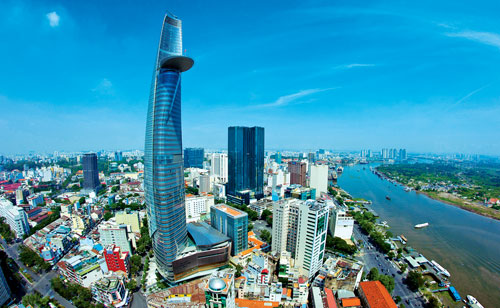Vietnam jumps 14 places in global enabling trade index
 |
| A corner of Ho Chi Minh City |
The advancement is largely driven by improvements in border administration, with improved customs efficiency (now at 66th) and reduced times for documentary and border compliance for both importing and exporting (a reduction of approximately 30 total hours for both cases), according to the Report.
These changes reflect recent efforts by the Government to streamline procedures at the border and reduce the burden of inspections by multiple agencies, but the country has a long way to go and rise to international standards.
Viet Nam has also improved access to its domestic market (74th, up four), increasing the share of goods imported free of duty (71%, up from 55 two years ago), but also the average tariff applied to dutiable imports (7.9%, from 6.8).
The country’s possibility to penetrate foreign markets has also improved, thanks to a lower average faced tariff (3.3%, down from 3.8) and increased margin of preference vis-à-vis other countries.
Infrastructure performance has been uneven, with improvements in transport infrastructure (up 14, to 66th), including a significance advancement in maritime connectivity (19th, up eight), and a deterioration of services (down nine, to 60th).
Operating environment has also been enhanced, thanks in particular to stronger protection of property rights and increased efficiency of public institutions.
First introduced in 2008, the Enabling Trade Index has provided a benchmarking tool to monitor progress on trade-enabling reforms. This year Report evaluates 136 economies based on their capacity to facilitate the flow of goods over borders and to their destinations.
The index represents a necessary first step in the reform process and informs decision-making and help with prioritization. It also helps identify good practices and success stories across the development ladder that can be emulated or scaled up at the regional level.
What the stars mean:
★ Poor ★ ★ Promising ★★★ Good ★★★★ Very good ★★★★★ Exceptional
Latest News
More News
- Foreign leaders extend congratulations to Party General Secretary To Lam (January 25, 2026 | 10:01)
- 14th National Party Congress wraps up with success (January 25, 2026 | 09:49)
- Congratulations from VFF Central Committee's int’l partners to 14th National Party Congress (January 25, 2026 | 09:46)
- 14th Party Central Committee unanimously elects To Lam as General Secretary (January 23, 2026 | 16:22)
- Worldwide congratulations underscore confidence in Vietnam’s 14th Party Congress (January 23, 2026 | 09:02)
- Political parties, organisations, int’l friends send congratulations to 14th National Party Congress (January 22, 2026 | 09:33)
- Press release on second working day of 14th National Party Congress (January 22, 2026 | 09:19)
- 14th National Party Congress: Japanese media highlight Vietnam’s growth targets (January 21, 2026 | 09:46)
- 14th National Party Congress: Driving force for Vietnam to continue renewal, innovation, breakthroughs (January 21, 2026 | 09:42)
- Vietnam remains spiritual support for progressive forces: Colombian party leader (January 21, 2026 | 08:00)
















 Mobile Version
Mobile Version